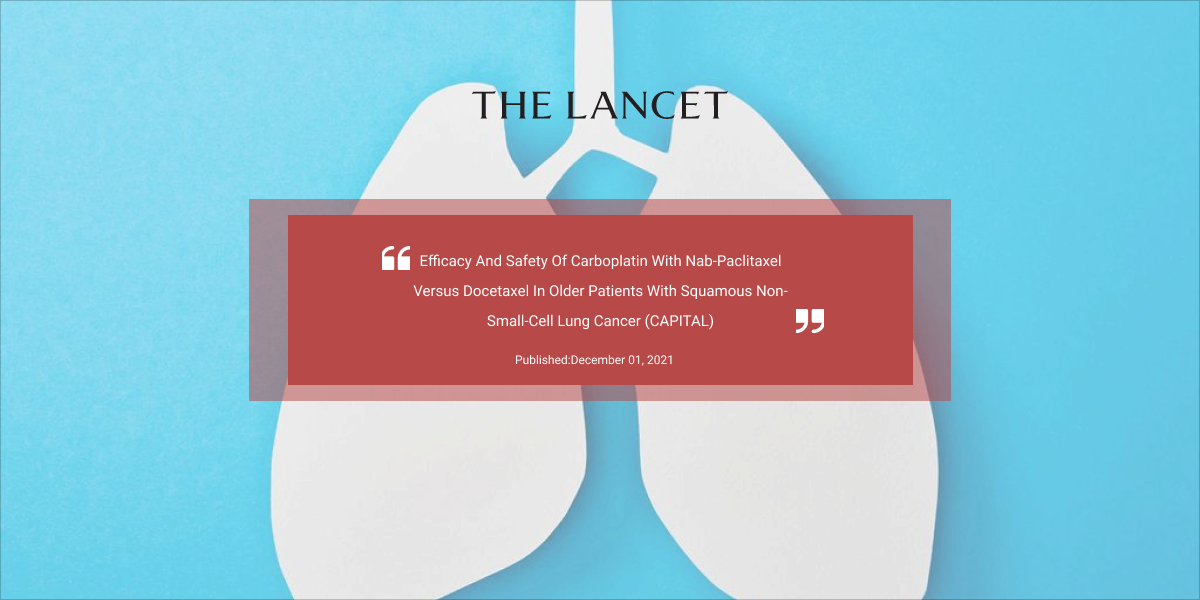Efficacy and safety of carboplatin with nab-paclitaxel versus docetaxel in older patients with squamous non-small-cell lung cancer (CAPITAL): a randomised, multicentre, open-label, phase 3 trial

Efficacy and safety of carboplatin with nab-paclitaxel versus docetaxel in older patients with squamous non-small-cell lung cancer (CAPITAL): a randomised, multicentre, open-label, phase 3 trial
Background
In Japan, docetaxel, a cytotoxic monotherapy, is the standard drug administered to older patients with advanced non-small-cell lung cancer (NSCLC). Carboplatin plus nab-paclitaxel has shown a high objective response rate in patients with squamous histology and was suggested to improve overall survival in patients aged 70 years and older. The CAPITAL trial aimed to assess the safety and efficacy of carboplatin plus nab-paclitaxel versus docetaxel as first-line therapy for patients aged 70 years and older with advanced squamous NSCLC.
Methods
This multicentre, open-label, randomised, phase 3 trial was carried out at 92 medical institutions in Japan. Eligible patients were aged 70 years and older, had advanced squamous NSCLC with no previous systemic chemotherapy, and had an Eastern Cooperative Oncology Group (ECOG) performance status of 0 or 1. Using an electronic data capture system, patients were randomly assigned (1:1) to intravenous carboplatin (area under the concentration-time curve of 6 mg/mL per min for 30 min) on day 1 of a 21-day cycle and intravenous nab-paclitaxel (100 mg/m2 for 60 min) on days 1, 8, and 15 every 3 weeks or intravenous docetaxel (60 mg/m2 for 60 min) on day 1 every 3 weeks. Randomisation was computer-generated per participant and stratified by ECOG performance status, clinical stage, sex, age, and institution. The primary endpoint was overall survival, measured in the full analysis set and defined as the time from registration to the date of death due to any cause. Safety was assessed in all patients who received at least one dose of the trial treatment. This trial is registered with the UMIN Clinical Trials Registry, UMIN000019843, and the Japan Registry of Clinical Trials, jRCTs041180110. After the planned interim analysis in Aug 3, 2020, the independent data monitoring committee recommended that the trial be stopped early. This report represents the final analysis.
Findings
Between Feb 24, 2016, and Aug 11, 2020, 196 patients were enrolled and were randomly assigned to the carboplatin plus nab-paclitaxel group (n=98) or the docetaxel group (n=98). Of these patients, four (carboplatin plus nab-paclitaxel group, n=3; docetaxel group, n=1) did not receive any treatment and two patients in the docetaxel group were excluded from the full analysis set. Median overall survival in the full analysis set was 16·9 months (95% CI 12·6–25·4) in the carboplatin plus nab-paclitaxel group and 10·9 months (8·5–12·4) in the docetaxel group (hazard ratio 0·52 [90% CI 0·38–0·70]; p=0·0003). Grade 3–4 adverse events occurred in 79 (83%) patients in the carboplatin plus nab-paclitaxel group and 77 (79%) patients in the docetaxel group (p=0·63). The most common grade 3–4 adverse events in the carboplatin plus nab-paclitaxel group and the docetaxel group were leukopenia (44 [46%] vs 55 [57%]; p=0·20), neutropenia (60 [63%] vs 75 [77%]; p=0·046), febrile neutropenia (nine [10%] vs 19 [20%]; p=0·073), and anaemia (37 [39%] vs two [2%]; p<0·0001). Serious treatment-related adverse events of all grades occurred in 13 (14%) patients in the carboplatin plus nab-paclitaxel group and 11 (11%) patients in the docetaxel group. Treatment-related deaths occurred in two (2%; respiratory failure n=1, visceral arterial ischaemia n=1) patients in the carboplatin plus nab-paclitaxel group and one (1%; sepsis) patient in the docetaxel group.
Interpretation
Our study showed that overall survival was longer with carboplatin plus nab-paclitaxel than with docetaxel, suggesting that carboplatin plus nab-paclitaxel can be used as standard first-line treatment for patients aged 70 years and older with advanced squamous NSCLC.
![]() Yoshihito Kogure, MD; Shunichiro Iwasawa, MD; Hideo Saka, MD; Yoichiro Hamamoto, MD; Akiko Kada, MPH; Hiroya Hashimoto, PhD; et al.
Yoshihito Kogure, MD; Shunichiro Iwasawa, MD; Hideo Saka, MD; Yoichiro Hamamoto, MD; Akiko Kada, MPH; Hiroya Hashimoto, PhD; et al.
© 2021 The Author(s). Published by Elsevier Ltd. This is an Open Access article under the CC BY-NC-ND 4.0 license.

